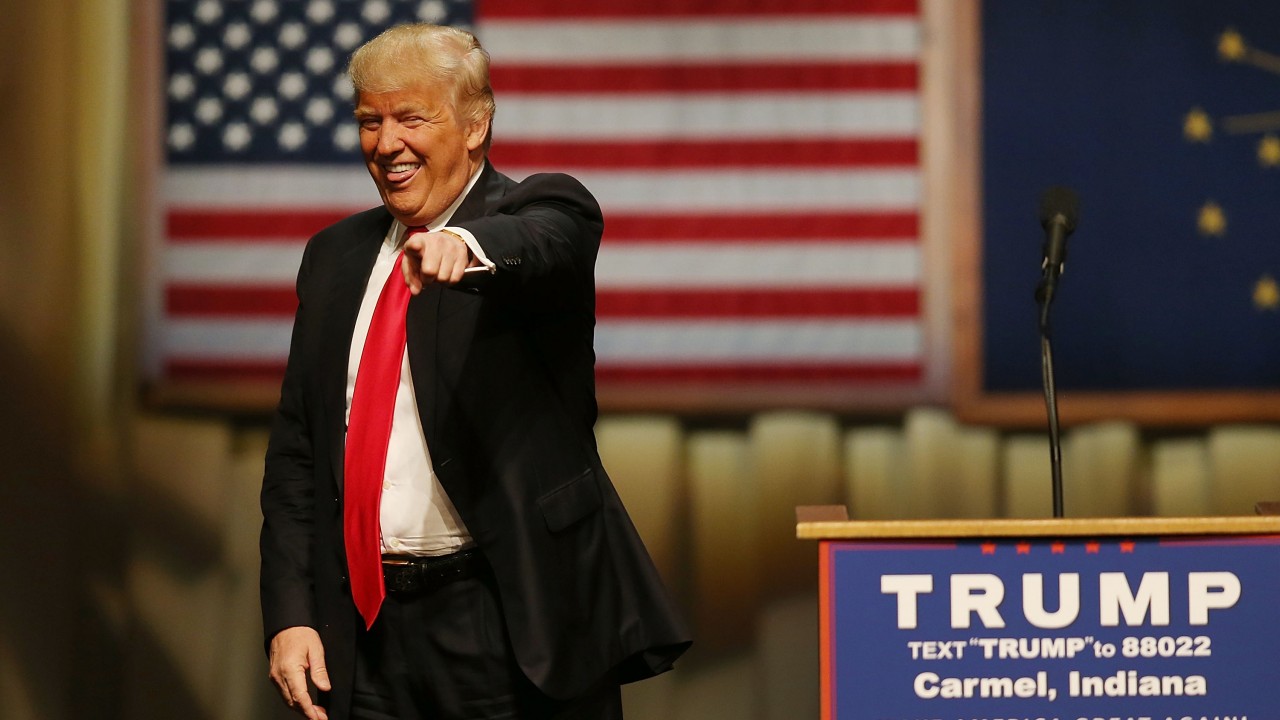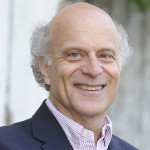
Republican presidential candidate Donald Trump at a campaign stop in Carmel, Indiana the day before the state's primary. (Photo by Joe Raedle/Getty Images)
Now that Donald Trump has all but officially won the GOP presidential nomination, New York Times columnist David Brooks asks, “What are we supposed to do?”
He isn’t asking Republican leaders that question. “They seem blithely unaware that this is a Joe McCarthy moment,” he writes. “Those who walked with Trump will be tainted forever after for the degradation of standards and the general election slaughter.” Rather, Brooks is asking what all of us who are appalled by Trump’s rhetoric and behavior are supposed to do about the developments that empowered his candidacy. Trump may very well destroy the Republican Party. But his ascendance, Brooks warns, is a symptom of a far more critical and pressing problem.
With the nation’s deepening class divide in mind, Brooks points to “how much pain there is in this country,” and describes a sense of personal and national decline and “rampant social isolation” induced in the hearts and minds of too many Americans. Observing that all of this has driven many of them to the populist campaigns of Trump and Bernie Sanders, Brooks argues that we are confronting nothing less than a national crisis of “social trust;” indeed, what author and editor R.R. Reno calls a “crisis of solidarity” that demands our urgent individual and collective action.
Although Brooks ends up proffering all the wrong answers, we should not fail to recognize the significance of what he has to say, for his lamentations and calls for action signal more than he realizes or surely intends us to hear. While his words do not speak directly to the renewal of Americans’ democratic energies, the anxieties he expresses should help us see that Americans are not simply pained by the class divide, but also determined to do something about it. Time for us to act.
Brooks fails to acknowledge what or who has actually led us into a Second Gilded Age, placing the American dream out of reach for vast numbers of Americans, and fostering that crisis of solidarity. He makes absolutely no mention of the class war from above that has marked American life for the past 40 years – a class war that has placed private greed and profits before the public good and general welfare. Not only has it made the rich exceedingly richer and working people poorer, it also has raised up an oligarchy to keep our democracy in check; laid siege to the hard-won rights of workers, women and African Americans; and devastated the communities, organizations and solidarities they built to make their lives more secure.
Ignoring or avoiding all of that, Brooks fails to appreciate what it may take to redeem the nation and liberate ourselves from the fear, pain and isolation that so many of us endure. As Brooks presents it, the historic task of overcoming the class divide and transcending the crisis of solidarity is to be undertaken not in the classic American fashion of citizens joining together and struggling to enhance freedom, equality, and democracy from the bottom up, but by professional and bourgeois elites working to rebuild social trust and solidarity. He does not call for – or even consider – the possibility of popular radical-democratic action against those who insist to their own benefit that we have reached the end of history. No, he proposes a grand program of national social therapy.
Brooks calls on professional and bourgeois folks, the people with whom he confesses he spends so much of his time, to willfully step out of their comfortable surroundings and get to know those who are in pain. Doing so, he says, will enable them to better understand their fellow citizens, develop compassion for them and cultivate a new, more-inclusive story of America. Bizarrely, he suggests that we might well replace the old, no-longer compelling American story in which “the lone individual…rises from the bottom through pluck and work” with one in which “those who suffer from addiction, broken homes, trauma, prison and loss… triumph over the isolation, social instability and dislocation so common today.”
Finally, citing such “national projects” as the WPA and NASA, and even hinting at a national service program, Brooks, showing some independence from the contemporary politics of conservatism, calls for launching both private and public initiatives that could serve to bind people together. And apparently eager to set a good example for his class comrades, Brooks actually promises that instead of dwelling in his column on the lives of bourgeois folk he will now “go out into the pain,” and report back.
Brooks tells us we are in crisis, that the nation’s deepening social divide has undone the solidarities of the past. Notably, he remains silent both as to how this happened and how those solidarities first developed. Though he cites the 1930s WPA as a program possibly worth emulating, he fails to mention how Americans fought the Great Depression by electing the progressive Democrat Franklin Roosevelt to the presidency and how that president led the fight for recovery, reconstruction, and reform both by launching public works projects to engage their labors in improving the nation, and empowering them to organize unions and collectively confront their bosses.
Brooks also fails to recount how in the course of those industrial struggles millions of Americans learned firsthand about solidarity and trust and not only succeeded in enhancing American democracy and securing better lives for themselves and their families, but also prepared us to beat our fascist enemies in World War II.
One cannot help but imagine that Brooks sees what we see – that growing numbers of Americans are rejecting the appeals of political establishments both right and left – and that seeing it gives him reason to be concerned, if not fearful and pained. Some Americans are angry. Some are hopeful. And yet, for all of their evident and at times antagonistic and vicious differences, the angry and the hopeful do seem to share a determination to confront the treachery of the nation’s political and economic elites and bring to an end the class war from above that has denied them their nation’s historic promise.
We can do so by articulating the democratic imperative and impulses Americans are beginning to feel once again, and by helping us better remember who we are and what we are capable of doing in the light of the solidarities and achievements of the past. The task for America’s intellectuals ought not to be, as Brooks sees it, to work at bridging the class divide, but rather to work at ending it.




